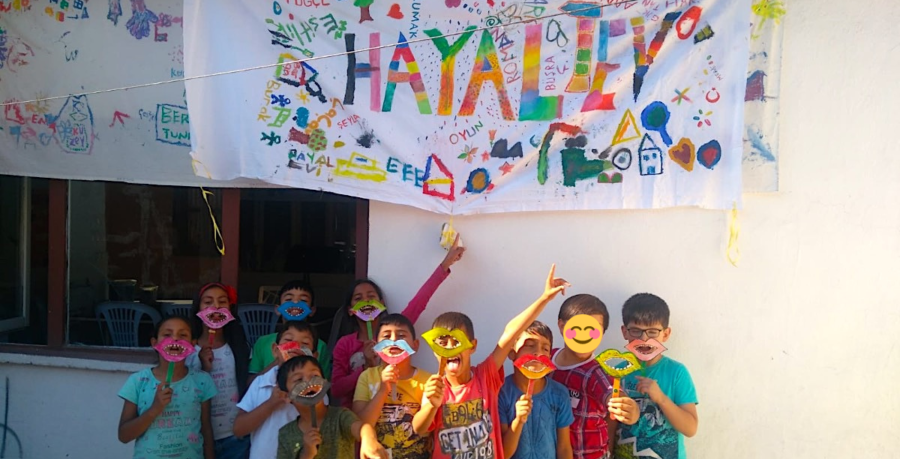
[vc_row][vc_column][vc_column_text]Roma Rights Association (Roman Hakları Derneği-ROMHAK) received a grant from our Children’s Fund to ensure the sustainability of its Dream House (Hayal Ev) Child Centre, which was established in Ankara’s Kale neighbourhood to improve the access of children at risk to their fundamental rights, encourage school attendance, and support their social inclusion. With the grant support, ROMHAK was able to continue the centre’s activities and workshops for children, which had come to a standstill due to the pandemic and the lack of financial resources.
Read below our interview:
According to the Education Monitoring Report 2021: Students and Access to Education, while the net schooling rate of children born in 2004 was 92.3% in 2020, it decreased to 88.5% in 2021. The fact that the legal working age is 15 is considered one of the reasons for this decline. How do you think can school dropouts and child labour be prevented?
Deepening poverty, economic insufficiencies, and the effects of the pandemic played a role in the decline in schooling rates. Another reason affecting schooling and child labour rates is the low level of awareness of families regarding childcare and child development. Based on our observations, we can say that children under the age of 15 are now working and this working age is, unfortunately, decreasing every passing day.
To prevent school dropouts, first, children should be evaluated along with their social environment, and their basic needs should be provided. Also, child-family-school relations should be assessed to ensure child welfare. We believe that trainings for families and teachers working in disadvantaged areas are crucial for raising awareness. In addition, we believe that awareness-raising trainings with a rights-based approach should be organised for professional groups such as police officers, etc.
Families struggling with deep poverty and primarily aiming to access basic food had to postpone even their concerns about their children’s education.
Can you tell us about the impact of the gradual normalisation process after the pandemic on children and their families? Have you encountered new or deepening needs?
The pandemic measures forced many workplaces to close, and adversely affected individuals working especially in daily and insecure jobs, which further deepened poverty. Failure to meet economic needs has caused individuals to experience a loss of rights. During the pandemic, online education has negatively affected access to education for children who did not have the required technological devices such as the internet, television, tablet, etc. Families struggling with deep poverty and primarily aiming to access basic food had to postpone even their concerns about their children’s education.
You have recently completed the Dream House project that you realised with our grant support. Can you tell us about the purpose of the project and the work you have carried out?
We are carrying out the Dream House project in the Kale neighbourhood of Ankara, where the most important problem for children is the lack of safe spaces. There are no safe parks, libraries and similar places for children. With this project, we aimed to establish a book and toy library, and create a safe area where children can play with toys, as well as read books and exchange them with each other. In addition to these activities, we organised trips and visits to parks, museums and universities. We tried to meet the more special needs of children through mentoring.
How has the grant support contributed to your organisation? Do you have a message for our donors who support the fund?
The Dream House project, which initially started in 2018, was a completely voluntary project with limited possibilities. Thanks to the support we received from you, our opportunities have expanded and improved considerably. Especially material support and the appointment of a coordinator made our work easier, and most importantly, our visibility increased. As a result of our negotiations with the Ankara Metropolitan Municipality, a place in the Ankara Castle was allocated to us to carry out our activities. Its external renovation has been completed, and we are expecting the interior renovation to be completed soon. We would like to tell the donors of the Children’s Fund that this grant has been a lifeline for us! It paved the way for our future work. We will never forget this support.
We would like to tell the donors of the Children’s Fund that this grant has been a lifeline for us!
What are the plans of ROMHAK for the year 2022?
We will move to the space donated to our association by Ankara Metropolitan Municipality, which will contribute to increasing the diversity of our activities for different groups. At the same time, our new space will prepare an environment for us to create a child-friendly space for our activities with children within the scope of the Dream House project.
Apart from this, we want to carry out our work in a holistic framework for the welfare of children in the area. We are planning awareness-raising activities for family members and teachers by addressing children’s relationships with their families and teachers. We also plan to prioritise young mothers in terms of family members. To develop more effective studies in the field and to ensure development and sustainability, we also plan to increase communication and strengthen relations with public institutions and organisations.
About Roma Rights Association
Founded in Ankara, Roma Rights Association works against inequalities in policy and decision-making mechanisms caused by the discriminatory treatment of Roma people. The association focuses especially on improving Roma children’s access to their rights and aims to increase their participation in formal education. ROMHAK conducts arts, education, drama, social cohesion and music workshops in different regions to empower children and their families.
[/vc_column_text][/vc_column][/vc_row]



